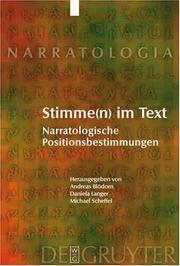| Listing 1 - 9 of 9 |
Sort by
|
Book
ISBN: 9783150160671 Year: 2009 Publisher: Stuttgart : Philipp Reclam,
Abstract | Keywords | Export | Availability | Bookmark
 Loading...
Loading...Choose an application
- Reference Manager
- EndNote
- RefWorks (Direct export to RefWorks)
Thomas Manns Zauberberg ist einer der eindrucksvollsten Romane der deutschen Literatur. Der Band erläutert in einem Zeilenkommentar die vielfältigen Bezüge, schlüsselt u. a. mythologische oder musikalische Anspielungen auf, bezieht sich auf die Zauberberg-Verfilmung (1982) und die Hörspielfassung (2000) und bringt neben Selbstaussagen Manns zum Text eine Auswahl der wichtigsten Forschungsstimmen.

ISBN: 3770541111 Year: 2005 Publisher: München : Fink,
Abstract | Keywords | Export | Availability | Bookmark
 Loading...
Loading...Choose an application
- Reference Manager
- EndNote
- RefWorks (Direct export to RefWorks)
Book
Year: 2005 Publisher: Fink
Abstract | Keywords | Export | Availability | Bookmark
 Loading...
Loading...Choose an application
- Reference Manager
- EndNote
- RefWorks (Direct export to RefWorks)
Dissertation
Year: 2003 Publisher: Liège : Université de Liège. Faculté de médecine (ULg). Département de clinique et pathologie médicales,
Abstract | Keywords | Export | Availability | Bookmark
 Loading...
Loading...Choose an application
- Reference Manager
- EndNote
- RefWorks (Direct export to RefWorks)
Book
Abstract | Keywords | Export | Availability | Bookmark
 Loading...
Loading...Choose an application
- Reference Manager
- EndNote
- RefWorks (Direct export to RefWorks)
Composers --- Music --- Compositeurs --- Musique --- Biography --- Correspondence --- Biographies --- Correspondance --- History and criticism --- 19th century --- Janácek, Leos --- Written works
Book
Abstract | Keywords | Export | Availability | Bookmark
 Loading...
Loading...Choose an application
- Reference Manager
- EndNote
- RefWorks (Direct export to RefWorks)

ISBN: 9783110185713 3110185717 9786612194993 1282194992 3110199955 9783110199956 Year: 2006 Volume: 10 Publisher: Berlin: de Gruyter,
Abstract | Keywords | Export | Availability | Bookmark
 Loading...
Loading...Choose an application
- Reference Manager
- EndNote
- RefWorks (Direct export to RefWorks)
Der Band lotet das methodologische Potenzial der zentralen narratologischen Kategorie der ,Stimme' im Verhältnis zur ,Person' aus und spezifiziert diese Kategorie vor allem vor dem Hintergrund von Genette und Bachtin. Neben theoretisch orientierten Beiträgen kommen Fallbeispiele zur Sprache, die stets mit einem allgemeineren methodologischen Erkenntnisinteresse verknüpft sind. Im Fokus stehen vor allem Grenzfälle eindeutig bestimmbarer Sprech(er)positionen in Texten. Die Beiträge fragen u. a. danach, welche Position und Funktion der Text selbst als literarische ,Stimme' einnimmt und ob Polyphonie als Vielfalt ,autonomer Stimmen' ohne Rückgriff auf das Konzept der ,Person' beschreibbar ist. Sie entwerfen neue theoretische Konzepte der ,Stimme' in der Narratologie, diskutieren das Phänomen der ,Mehrstimmigkeit' in literarischen Texten und untersuchen die Kategorie der ,Stimme' in Bezug auf ihre Tragfähigkeit als Instrument der Textanalyse. Der Band geht dem Verhältnis von Erzähler- und Figurenrede innerhalb des Dreiecks von Autor, Erzähler und Figur in all seinen Facetten nach und bezieht dabei historische sowie kognitions- und rezeptionspsychologische Aspekte mit ein. Er bietet insofern innovative Grundlagenforschung zu zentralen Fragen der modernen Erzähltheorie. The volume sounds out the methodological potential of the central narratological category of 'voice' in its relation to 'person' and specifies this category principally against the background of Genette and Bachtin. In addition to papers with a theoretical orientation, there are also case studies, these always being linked with more general methodological concerns. The main focus is on borderline cases for unequivocally determining the position of the speaker or speech in texts. The papers examine, for example, the position and function of the text itself as a literary 'voice', and whether polyphony can be described as a variety of 'autonomous voices' without recourse to the concept of 'person'. The authors draw up new concepts of 'voice' in narrative theory, discuss the phenomenon of 'multiple voices' in literary texts and examine the category of 'voice' for its relevance as an instrument of textual analysis. The volume investigates all aspects of the relationship between the narrator's speech and that of the narrative figures within the triad of author, narrator and figure, drawing in historical aspects and insights from the psychology of cognition and reception. In this it presents innovative fundamental research on central questions of modern narrative theory.
Fiction --- Literary rhetorics --- Poétique --- --Esthétique --- --Narration (Rhetoric) --- 82-3 --- Proza. Fictie. Narratologie --- Discourse analysis. --- Narration (Rhetoric) -- Congresses. --- Narration (Rhetoric). --- 82-3 Proza. Fictie. Narratologie --- Narration (Rhetoric) --- 82-3 Fiction. Prose narrative --- Fiction. Prose narrative --- Rhetoric --- Discourse analysis, Narrative --- Narratees (Rhetoric) --- Esthétique --- Narration (Rhetoric) - Congresses
Book
ISBN: 9782951238630 Year: 2001 Publisher: Paris Musica falsa
Abstract | Keywords | Export | Availability | Bookmark
 Loading...
Loading...Choose an application
- Reference Manager
- EndNote
- RefWorks (Direct export to RefWorks)


ISBN: 9783110199956 9783110185713 Year: 2008 Publisher: Berlin ;; Boston De Gruyter
Abstract | Keywords | Export | Availability | Bookmark
 Loading...
Loading...Choose an application
- Reference Manager
- EndNote
- RefWorks (Direct export to RefWorks)
| Listing 1 - 9 of 9 |
Sort by
|

 Search
Search Feedback
Feedback About UniCat
About UniCat  Help
Help News
News